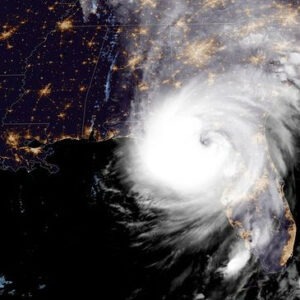Updated Friday, October 18, 2024
Grantmakers In Health (GIH) is saddened by the devastation wrought by Hurricanes Helene and Milton in communities across the southeastern United States, affecting many of our Funding Partners and the people they serve. However, we are heartened to see the strong show of support from philanthropy, government, businesses, and individuals to help those affected by the storm recover. But this is not an isolated event—climate change is intensifying hurricanes, fires, and other forms of extreme weather, with their effects felt by more communities than ever before.
GIH Funding Partner Dogwood Health Trust is based in Asheville, North Carolina, which suffered catastrophic flooding from Hurricane Helene. Fortunately, their staff and board members are safe and accounted for. They recently released a statement about their support of the Emergency and Disaster Response Fund, which will accept and disburse funds for regional response and relief efforts in the Qualla Boundary and 18 counties of Western North Carolina
Many of us want to help, and there is much that philanthropy can do to support those trying to respond and recover. Immediate unrestricted grants to trusted local organizations on the ground can get support to those who need it, while long-term recovery support can help build resilience in the communities hit hardest. In addition, it is important to consider the unique needs of historically underserved and vulnerable populations who are often disproportionately affected by disasters. Some philanthropic organizations may also have resources they can offer beyond financial contributions —in-kind support, such as transportation, housing, and expertise can be invaluable in making a difference.
For those interested in supporting local efforts, a number of organizations are providing aid on the ground in North Carolina—these include the American Red Cross, Diaper Bank of NC, Operation Airdrop, Second Harvest Food Bank of Northwestern North Carolina, and The Community Foundation of Western North Carolina. Our colleagues at the Florida Philanthropic Network have compiled a comprehensive list of Florida resources for the Helene and Milton recoveries, as well as information on how to support North Carolina communities. In addition, several philanthropy support organizations and funders have shared resources and giving opportunities, including Florida Philanthropic Network, Foundation for Appalachian Kentucky, North Carolina Network of Grantmakers, and Philanthropy Southeast.
Our colleagues at the Center for Disaster Philanthropy have a number of resources that can help funders plan their response. They also hosted a webinar, “Hurricane Helene: How funders can support recovery,” to educate funders about the urgent and ongoing needs of affected communities.
It is also crucial for philanthropic organizations to update their own emergency management plans, as well as anticipate how they can use their resources to help when future disasters strike. GIH also encourages its Funding Partners to strengthen their networks in anticipation of future weather emergencies and natural disasters.
We know that recovery will take time, and GIH will be here to support health philanthropy in its efforts to help those affected by Hurricane Helene and its aftermath.

